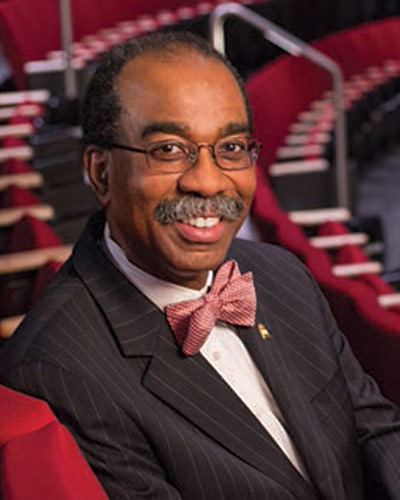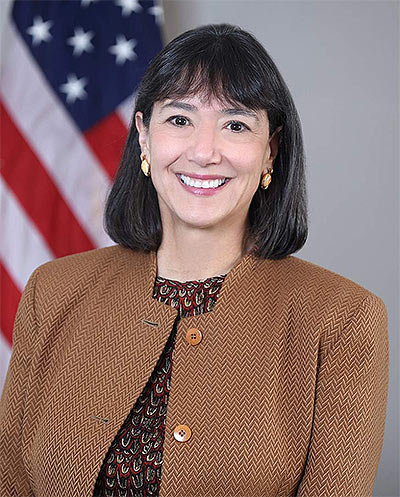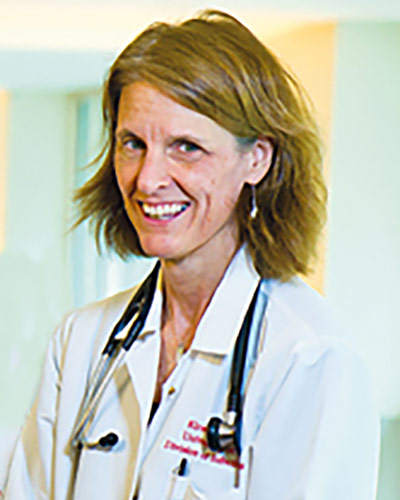October 28, 2024 | Holly Moody-Porter

Former UMSOM Dean E. Albert Reece Co-Authored a New Report on the State of Biomedical Research for the National Academy of Medicine
In an effort to address the urgent challenges facing biomedical research, E. Albert Reece, MD, PhD, MBA Distinguished University Professor and former Dean, University of Maryland School of Medicine, chaired a prestigious group of physician-scientists who authored a new National Academy of Medicine report released earlier this month.
 The report, which outlined issues threatening progress in biomedical research and identified priority areas for action, was discussed in a widely attended webinar led by Dr. Reece with more than 300 attendees. Dr. Reece also co-authored a paper published in the New England Journal of Medicine with Dr. Victor Dzau, President of the National Academy of Medicine, which summarizes the report, and was quoted in a Science news article explaining findings.
The report, which outlined issues threatening progress in biomedical research and identified priority areas for action, was discussed in a widely attended webinar led by Dr. Reece with more than 300 attendees. Dr. Reece also co-authored a paper published in the New England Journal of Medicine with Dr. Victor Dzau, President of the National Academy of Medicine, which summarizes the report, and was quoted in a Science news article explaining findings.
During the webinar, he underscored the need for increased coordination of resources in order to address rising rates of maternal mortality, drug overdoses, obesity and a declining life expectancy in certain populations.
“Simultaneously with these health challenges, the U.S. remains the highest spender in dollars on biomedical research,” said Dr. Reece who is Director of the Center for Advanced Research Training & Innovation (CARTI) at UMSOM and a Scholar-in-Residence at the National Academy of Medicine. “However, what we have observed is that the larger the research enterprise grows, the less coordinated it becomes.”
The webinar then went on to highlight five key areas of opportunity to strengthen the field of biomedical research and innovation to a panel of distinguished leaders in medicine that included Monica Bertagnolli, MD, Director of the National Institutes of Health.
 “The NIH might be the largest funder of biomedical research, however we can never succeed--we cannot succeed--without playing an effective role within a much broader ecosystem that delivers health to people,” she said. “Getting the coordination together across all partners can influence how we can bring discovery to the U.S. healthcare system to promote health for everyone.”
“The NIH might be the largest funder of biomedical research, however we can never succeed--we cannot succeed--without playing an effective role within a much broader ecosystem that delivers health to people,” she said. “Getting the coordination together across all partners can influence how we can bring discovery to the U.S. healthcare system to promote health for everyone.”
The priority areas included:
- creating a strategic national vision
- streamlining and coordinating funding across sectors
- prioritizing health equity
- improving federal coordination and the application of convergence science
- developing a future-ready workforce.
One specific goal discussed was the appointment of an advisory body representative of scientists across all disciplines, federal agencies and the public to help guide Congress and the President in the development of a “national strategic vision”. The advisory body would help identify the greatest needs in biomedical research efforts and ways to meet those needs by better supporting the workforce, coordinating funding, and pooling technological and scientific resources. This model is already implemented to great success in other countries like China and Singapore as detailed in the report.
“With so many things going on in technology, politics, and the biomedical research ecosystem, it's time for a new strategic vision,” said Dr. Dzau. “The enterprise needs a recharge in order to address the complex health challenges we are facing.”
The group also pushed for improved streamlining and coordinating of existing research investments across the government, private sector, and philanthropy. They proposed a national biomedical research “funding collaborative” that would pool contributions and provide recommendations on how to best organize and allocate shared investments. This would help bridge the “funding valley of death” which hinders the translation of basic research discoveries into new therapies.
“Only eight percent of molecules investigated by researchers for their promise as a new therapy actually make their way into FDA-approved drugs,” said panelist John Reed, MD, PhD, Executive Vice President, Innovative Medicine, R&D, at Johnson & Johnson. “The more we can invest in technologies that enable that process to be more fruitful and less trial and error, the better the whole ecosystem is.”
The report also emphasized the need to strengthen the domestic STEM workforce and prioritize research that informs solutions for achieving health equity in the country. The group recommended elevating work that helps understand and eliminate the barriers that keep populations from receiving high-quality healthcare such as the digital divide, access to transportation, as well as trust in science and medicine.
“The undeniable fruits of the U.S. biomedical research enterprise have not reached all populations equally as we have been stressing and it cannot be delivered where there are healthcare workforce shortages,” said Ann Kurth, PhD, President of the New York Academy of Medicine and a member of the author group.
In effort to expand the workforce, the authors recommended removing barriers that prevent integration of international scientists into the workforce, such as expanding eligibility for federal research funding to temporary visa holders. Dr. Reece noted that more than 50 percent of PhD postdocs are temporary visa holders. The group also urged incentivizing the pursuit of K-12 STEM education in effort to encourage more American students to pursue college degrees and careers in science and medicine.
To better address the nation’s health concerns as outlined in the report, the group’s final recommendation concerned establishing a federal requirement to coordinate funding, strategy, and information sharing across federal agencies. This requirement could promote the use of convergence science – an approach that brings together various scientific disciplines to address complex health challenges, which was successful during the COVID-19 pandemic.
The full webinar and report can be found here.
Contact
Holly Moody-Porter
Sr. Media & Public Relations Specialist
hmoody@som.umaryland.edu
Related stories

Thursday, October 12, 2023
UM School of Medicine's Kirsten Lyke Elected as Member of Prestigious National Academy of Medicine
Kirsten E. Lyke, MD, Professor of Medicine and Physician-Scientist at the Center for Vaccine Development and Global Health (CVD) at the University of Maryland School of Medicine (UMSOM), was elected this week as a new member of the National Academy of Medicine (NAM). She was recognized for her pivotal research in emerging infections and human challenge models that have informed and shaped global vaccine and public health policy.
